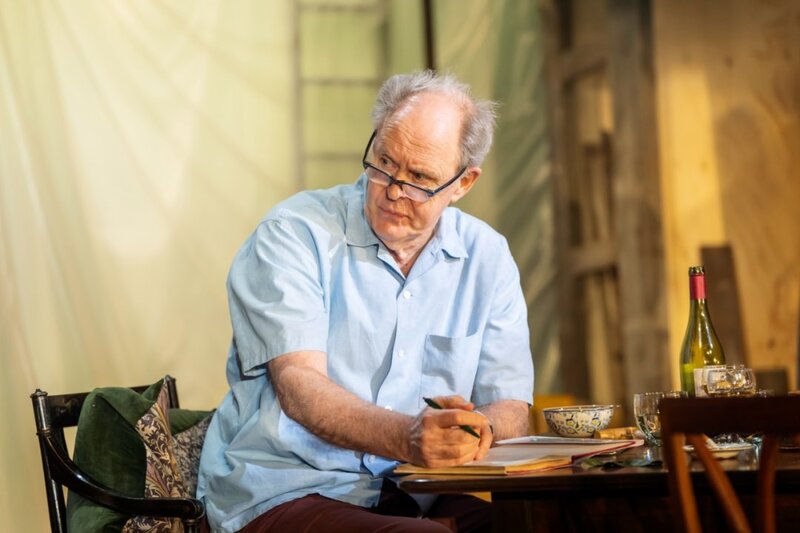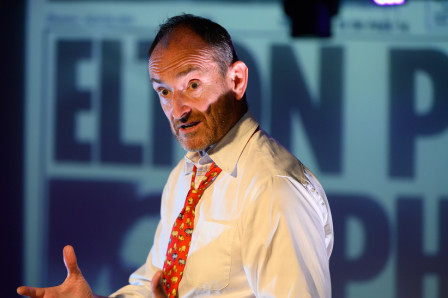Review: GIANT at Harold Pinter Theatre
Following its huge commercial and critical success at the Royal Court, Mark Rosenblatt’s GIANT (Olivier Award for Best Play) this week began a West End transfer, settling at the 872 seater Harold Pinter until 2nd August.
 Giant production image. Photo by Johan Persson
Giant production image. Photo by Johan Persson
Helmed by Nicholas Hytner, the majority of the original cast are reprising their roles, including Olivier award winners John Lithgow and Elliot Levey (as Roald Dahl and his English publisher Tom Maschler respectively). Also transferring, are Rachael Stirling (as Felicity Crosland), Tessa Bonham Jones (as Hallie) and Richard Hope (as Wally Saunders). Joining them is Aya Cash (as Jessica Stone, representing the US publisher).
Renowned children’s author Roald Dahl is holed-up at his home Gypsy Cottage sometime after his divorce from Patricia Neal and before his marriage to Felicity Crosland. The house is in a state of disarray as builders attempt to remodel, despite Dahl’s continual protestations that they cease work due to noise disruption. His renowned irascibility and flashes of temper populate the play set on a day which sees the arrival at the house, of his UK publisher Tom Maschler, later to be joined by Jessica Stone, who we’re told has been despatched by his US publishers. Both bring dark tidings of disquiet following Dahl’s recent publication of an article condemning Israel for its incursion into Lebanon and the massacring of children. In response to his severe criticism of Jews in general, both of his visitors envisage a backlash which will negatively impact sales of his new book The Witches and future demand for his back catalogue. There have also been phoned death threats to the house, and a policeman is stationed at the front door.
Much of the play is a rather delicious word salad of fiery exchanges, wry observations and acerbic entrenchment over lunch. Dahl’s unrelenting goading and initial justification of his antisemitism, are tolerated by his visitors, whose simple objective is damage limitation through the issuance of a contrite, sensitively worded communiqué. No-one however, seems capable of convincing the author of its necessity or appropriateness and he doubles-down on the anti-Jewish fervour, culminating in an almighty bust-up during which the excellent Mrs Stone (“…or is it Stein?”) loses her patience and control, rebuking her host in a powerful and impassioned tirade which closes the first half. This is sharply structured and finely honed playwriting at its best and subtly demonstrates the huge complexity which continues to inform and divide attitudes and debate about Jewish stereotyping, Israel’s place in the geopolitical landscape and the dangers in conflating all Jews with Israeli foreign policy.
Peppered throughout, are joyous nuggets of relief from Dahl’s intellectual bitterness and badgering, where his humanity and concern — particularly for children — is revealed. All the characters in his orbit, down to the young antipodean cook, deliver cracking one-liners. And his long-suffering but intensely loyal future wife, lands an absolute zinger, demonstrating the limitations to her tolerance and latent capacity to check his worst behavioural tendencies.
Thankfully Rosenblatt avoided the temptation to include a clichéd line warning about meeting one’s heroes, but few watching this play will be left in any doubt that Giant could just as easily have been titled Monster.
Plays until the beginning of August, and not to be missed.
Latest News

 Beatrice Penny-Touré to join West End production of THE PHANTOM OF THE OPERA
6 February 2026 at 13:59
Beatrice Penny-Touré to join West End production of THE PHANTOM OF THE OPERA
6 February 2026 at 13:59

 Initial cast and creative team for ROSIE A NEW MUSICAL West End premiere concert
6 February 2026 at 10:02
Initial cast and creative team for ROSIE A NEW MUSICAL West End premiere concert
6 February 2026 at 10:02

 Review: MONSTERING THE ROCKETMAN at Arcola Theatre
6 February 2026 at 09:01
Review: MONSTERING THE ROCKETMAN at Arcola Theatre
6 February 2026 at 09:01

 HERE THERE ARE BLUEBERRIES at Stratford East - First look images released
5 February 2026 at 15:35
HERE THERE ARE BLUEBERRIES at Stratford East - First look images released
5 February 2026 at 15:35